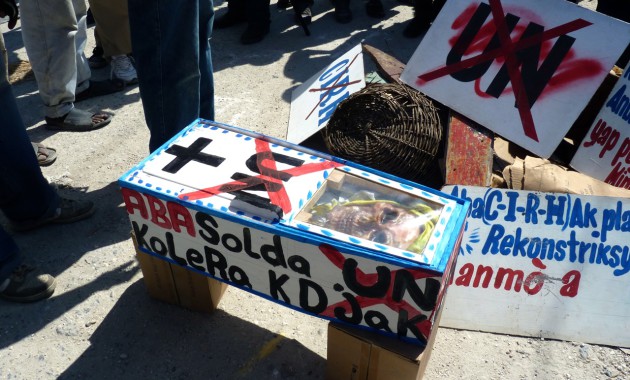The UN’s Responsibility for the Cholera Outbreak in Haiti

(photo by mediahacker.org)
Written by Philippa Webb –
In Haiti, a human-created disaster is exacerbating the devastation caused by the natural disasters of earthquakes and hurricanes. Haiti had been free of cholera, an acute water-borne disease, for a century, but 7,700 Haitians have died and 600,000 have been infected since October 2010 [1].
What caused this outbreak? All indications point to the United Nations troops from Nepal, dispatched to Haiti in October 2010 as part of the UN stabilization force (MINUSTAH) to provide assistance in the aftermath of a massive earthquake. A leading French epidemiologist, Renaud Piarroux, concluded that the outbreak came from the MINUSTAH camp. Further scientific studies have confirmed this and even used genetic sequencing to match the cholera strain to a sample from Nepal [2]. Bill Clinton, UN Special Envoy to Haiti, admitted the UN was the ‘proximate cause’ [3].
The UN commissioned a report by an Independent Panel of Experts that indicated the cholera was caused by bacteria that entered the Mere Tributary System of the Artibonite River [4], which is where the Nepalese contingent was based. The report, however, emphasized that the introduction of the bacteria could not have been the source of the outbreak without the deficiencies in Haiti’s water, sanitation and health care system and the outbreak was ‘not the fault of … a group or individual’.
But the poor conditions in Haiti were entirely foreseeable – it is the most impoverished country in the Western Hemisphere, ranking 158 on the Human Development Index [5]. The UN should have screened the troops coming from cholera endemic countries or given them antibiotics before departure; it should have ensured the waste disposal and sanitation systems at the camps were working properly. These are not novel ideas: they are recommended by the UN-commissioned report, but only in the context of preventing a future outbreak.
The tragedy of the cholera outbreak in Haiti is heightened by the UN’s refusal to take responsibility. Article 105 of the UN Charter provides that the Organization and its officials shall enjoy in the territory of each of its Members such privileges and immunities as are necessary for the fulfilment of its purposes. This immunity can always be waived, but the UN has remained silent. More specifically, Haiti and the UN concluded a standard Status of Forces Agreement that limits the jurisdiction of the courts of Haiti over MINUSTAH [6]. Paragraph 55 states that disputes of a private-law character shall be settled by a standing claims commission. Quite apart from the question whether this claim is of a private law nature, the UN has failed to establish a standing claims commission during its 8 years in Haiti.
The UN has an obligation under international law to provide reparation for injuries caused by an internationally wrongful act [7]. In 1996, the Secretary-General observed that ‘since the inception of peacekeeping operations, [the UN has] assumed its liability for damage caused by members of its forces in the performance of their duties’ [8]. That alleged pattern of accountability is being broken in Haiti.
In November 2011, two NGOs (the Institute for Justice & Democracy in Haiti and Bureau des Avocats Internationaux) filed claims on behalf of 5,000 Haitian victims of cholera with MINUSTAH and the Secretary-General [9]. The UN Office of Legal Affairs said it would respond ‘in due course’. One year later, the claimants are still waiting.
A documentary on the outbreak, Baseball in the Time of Cholera, won Best Documentary Short at the 2012 Tribeca Film Festival. You can watch it here: http://vimeo.com/45573842
Notes:
[1] Haiti Ministry of Public Health and Population statistics of 23 November 2012: http://www.mspp.gouv.ht/site/index.php?option=com_content&view=article&id=120&Itemid=1
[2] See citations in Mark Weisbrot, ‘The United Nations must cure Haiti of the cholera epidemic it caused’, 12 November 2012: http://www.guardian.co.uk/commentisfree/2012/nov/12/united-nations-haiti-cholera-epidemic
[3] Quoted in http://www.economist.com/node/21553450
[4] http://www.un.org/News/dh/infocus/haiti/UN-cholera-report-final.pdf
[5] http://hdrstats.undp.org/en/countries/profiles/hti.html
[6] http://ijdh.org/wordpress/wp-content/uploads/2011/11/4-Status-of-Forces-Agreement-1.pdf
[7] Article 31 of the International Law Commission Draft Articles on Responsibility of International Organizations (2011).
[8] Report of the Secretary-General, UN Doc. A/51/389 (1996), para. 7.
[9] http://ijdh.org/cholera-accountability/cholera-litigation









































